Governance
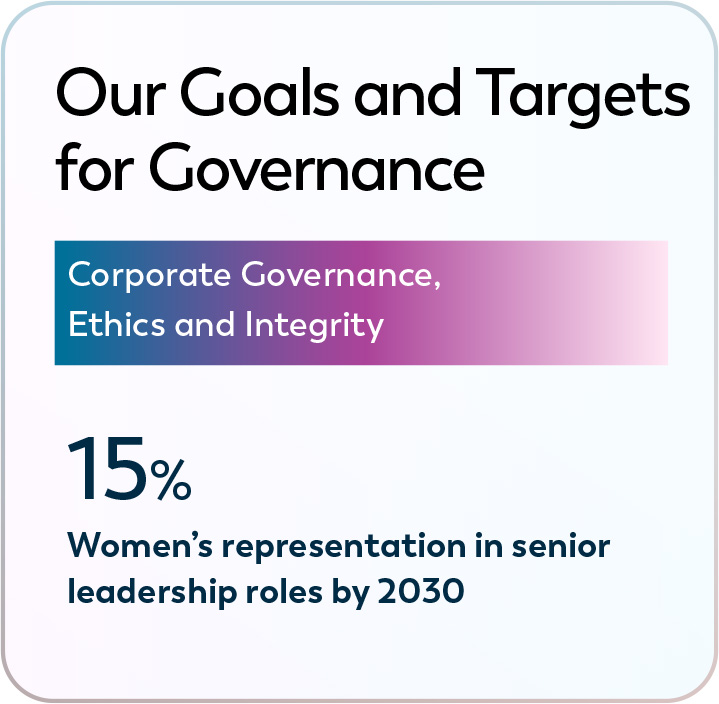
We view governance not simply as vigilance, but as a vital foundation for ethical conduct, strategic delivery and sustainable value creation. As our business continues to evolve, it has become a key driver of stakeholder trust, supported by transparency, accountability and regulatory compliance.
Our governance framework is carefully designed to align operational decisions with stakeholder expectations. It acts both as a safeguard and a strategic tool, enabling effective risk management, responsible resource allocation and growth that is commercially sound and socially responsible. This approach reflects our ongoing commitment to responsible leadership and long-term performance.
Corporate Governance and Good Governance bonded, resulting in Ideal Governance — a balanced, dynamic framework that focuses on business performance along with societal impact.
Ideal Governance means that we integrate transparency, accountability and responsibility across every level of our operations. It’s about making decisions that not only benefit stakeholders but also align with our values of integrity, sustainability and innovation. This holistic governance framework helps us ensure that our growth is responsible, sustainable and impactful — driving long-term value for stakeholders.
Our Governance Framework isn’t just a set of rules or policies; it’s the guiding force that shapes how we do business and how we contribute to the universe at large. Whether it’s through fostering innovation in our products, ensuring ethical practices in our supply chain, or making a positive impact on society, Polycab’s Ideal Governance sets the standard for how a forward-thinking company can lead responsibly.
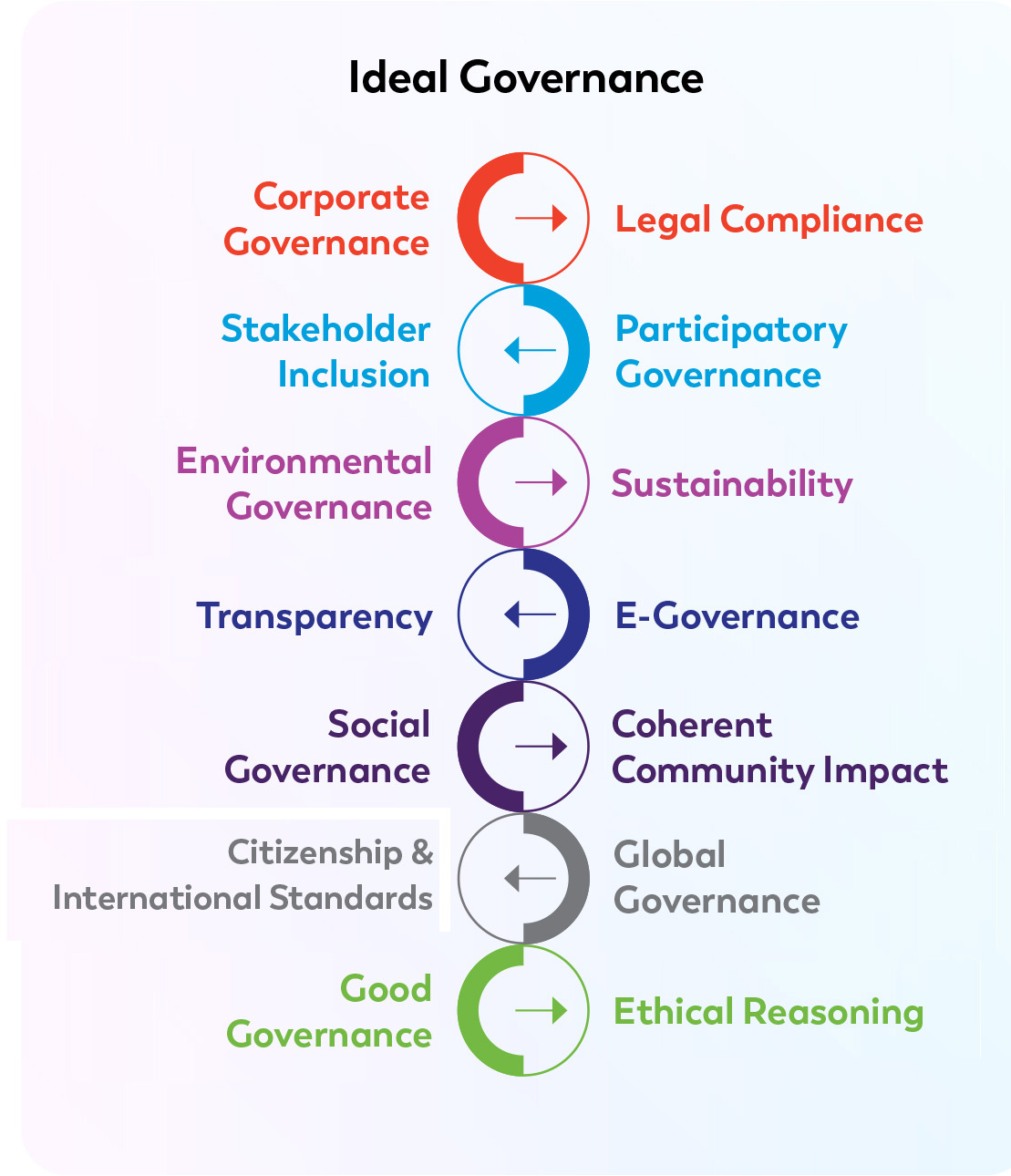
Forms of governance
Underlying principles
Corporate Governance
- Principle of strict compliance
- Based on the theory of strict adherence to law
Participatory Governance
- Principle of inclusivity
- Based on the theory of recognition of voice of all stakeholders
Environmental Governance
- Principle of sustainability
- Based on the theory of protecting the environment
E-Governance
- Principle of transparency
- Based on the theory of providing correct information to all stakeholders simultaneously
Social Governance
- Principle of coherence
- Based on the theory of creating a unified whole for the benefit of public at large
Global Governance
- Principle of proliferation
- Based on the theory of global citizenship and international compliances
Good Governance
- Principle of logic
- Based on the theory of valid reasoning and argumentation
Our governance framework defines responsibilities across all levels of the organisation and ensures consistent implementation through clearly articulated directives, policies and codes of conduct. We support this with structured systems, regular training and standardised operating procedures. Evaluation of the framework is done periodically to assess its effectiveness and adapt to emerging requirements.
Definition
Defines the principle and basis for achieving best in class corporate governance practices.
Measurability
Relevance
Actions
The Company strives to achieve best-in-class corporate governance by promoting its philosophy through various mediums and encouraging stakeholders to comply and propagate these principles.
Definition
Comprises of well-defined policies, codes and practices which helps in effective and efficient conduct of business.
Measurability
Adequacy
Actions
The Company reviewed and strengthened its Codes and Policies, considering stakeholder interests, legal amendments, business strategy and best governance practices, while establishing support policies to ensure compliance, sustainability and third-party validation.
Definition
Establishes a multi-tier governance structure for effective implementation of policies, codes and practices.
Measurability
Accountability
Actions
The Company implemented a governance structure that empowers internal and external stakeholders to make independent decisions within a predefined framework while assigning additional responsibilities aligned with economic, business, environmental, social and governance goals to ensure best-in-class corporate governance.
Definition
Comprises of standard operating processes and practices aiding structured control, monitoring and reporting of compliances.
Measurability
Process Management
Actions
The Company continues to develop, implement and promote tailored standard operating processes, digital tools and e-learning modules to systematically enforce Codes and Policies, leveraging software, artificial intelligence and online platforms to enhance productivity, communication, collaboration, compliance, risk awareness and digital transformation for efficient governance.
Definition
Includes oversight mechanism for internal and external stakeholders to provide feedback, recommendations, grievance and receive effective redressal.
Measurability
Transparency & Information Exchange
Actions
The Company optimised its evaluation process through systematic oversight, grievance redressal, open communication and stakeholder feedback, while upholding a “Zero Tolerance” policy and a “Zero Fear of Retaliation” environment to foster transparent governance and unrestricted access to reliable information.
Our corporate governance philosophy is built on the principles of transparency, accountability and ethical behaviour. It shapes our approach to responsible decision making, supports regulatory compliance and strengthens stakeholder trust. We follow structured processes for engaging with stakeholders, addressing feedback and resolving grievances. By embedding governance into our organisational culture, we encourage responsible conduct at every level and remain focused on creating sustainable value over the long-term. This philosophy underpins our governance framework and aligns with globally recognised standards and stakeholder expectations.
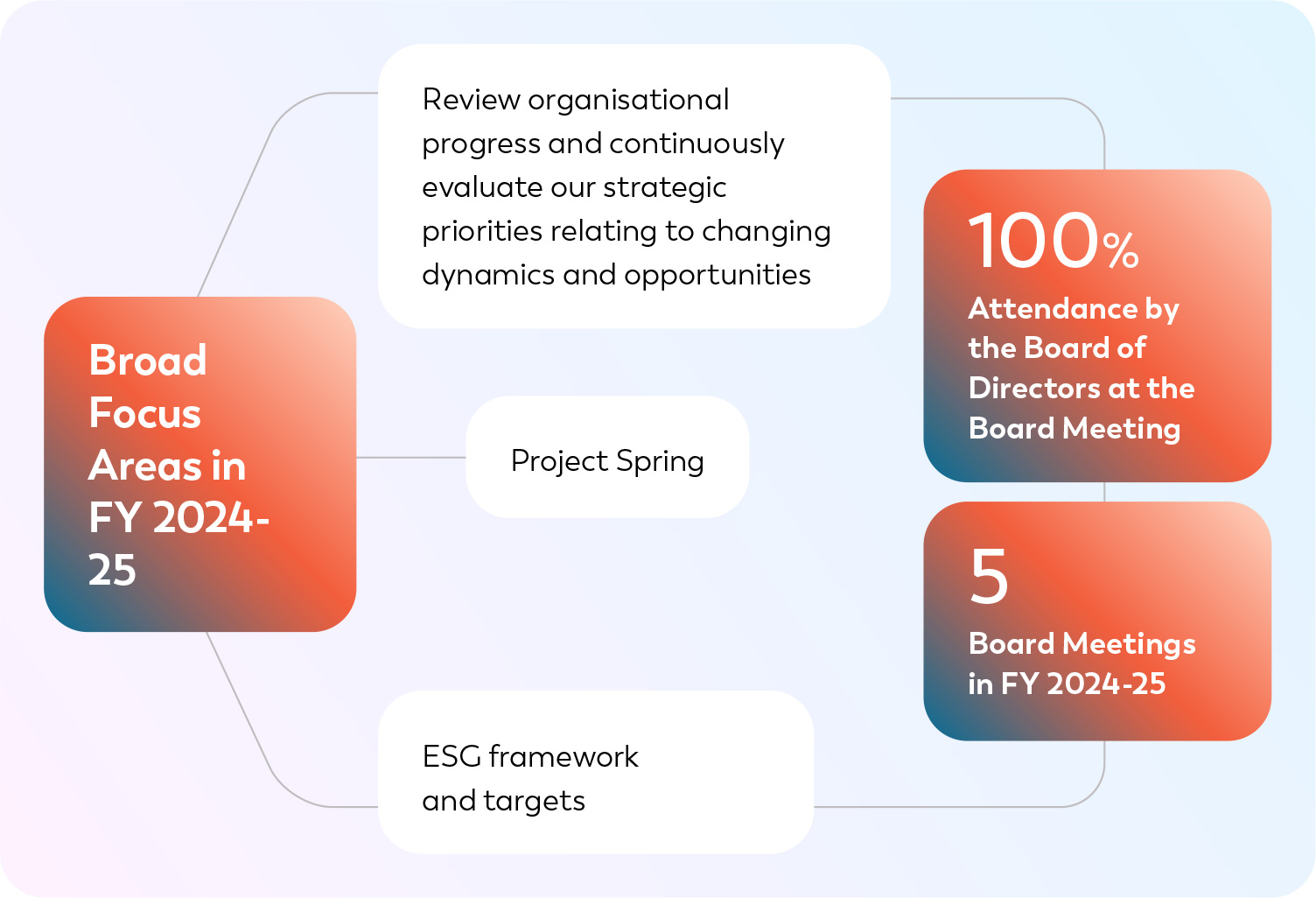
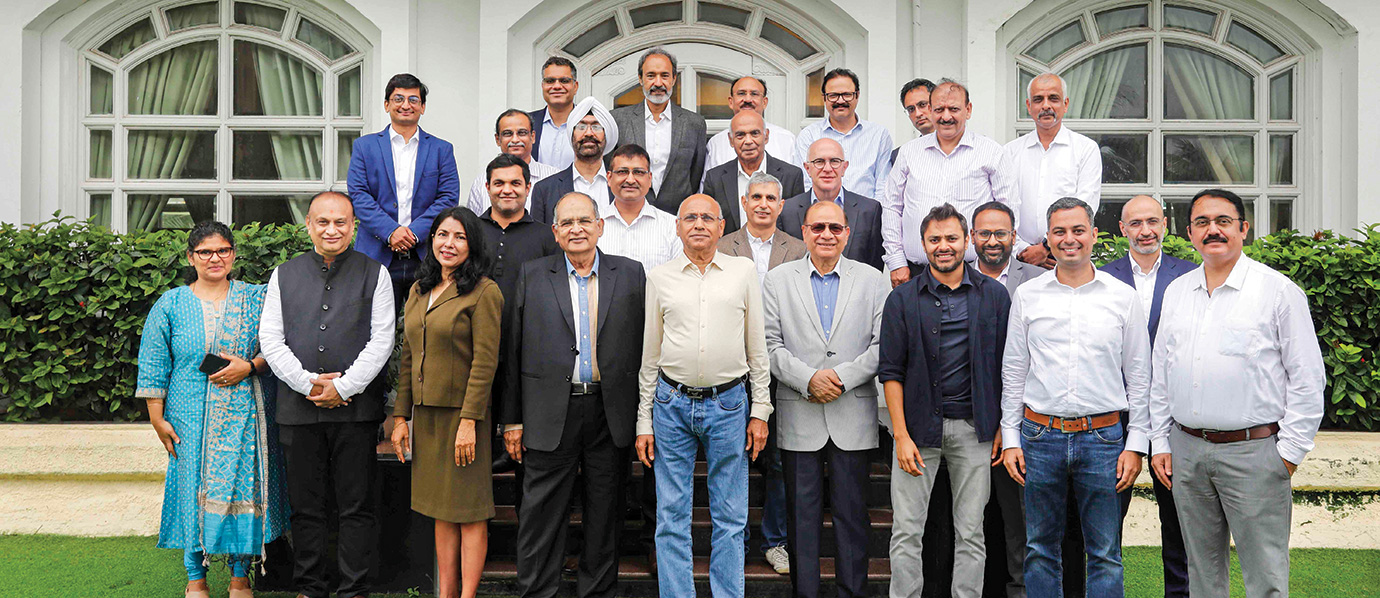
Our governance structure establishes clear lines of accountability across the Board, senior management and key committees. The Board is responsible for strategic direction and oversight, while management ensures execution in accordance with defined risk parameters and policy guidelines. Robust internal controls and well-established governance policies support regulatory compliance, consistent decision making and operational discipline.
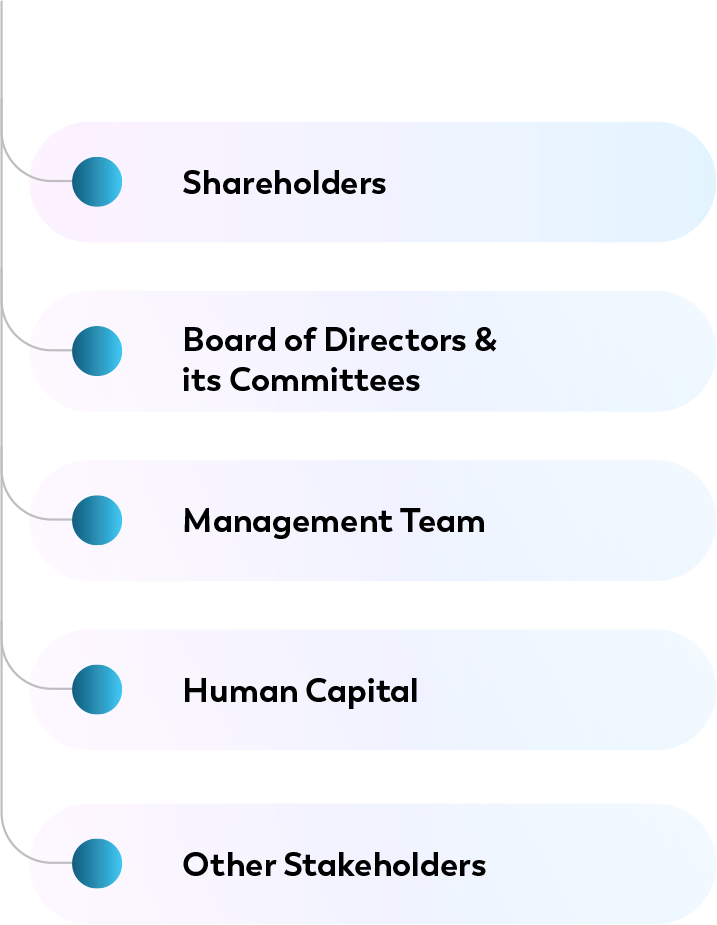

We have diligently mapped our strategies to internationally recognised standards, ensuring compliance with the Organisation for Economic Co-operation and Development (OECD) principles of corporate governance. This alignment strengthens our framework, addressing both global benchmarks and the unique needs of our operations and stakeholders.


Ethical business practices are at the core of Polycab’s Whistleblower Policy, providing a secure and confidential channel for reporting misconduct, fraud, or regulatory violations. The policy complies with Section 177 of the Companies Act, 2013 and SEBI regulations, establishing a vigilant mechanism to address serious concerns affecting our Company’s operations and protecting whistleblowers from retaliation. A designated Whistleblower Committee receives and investigates all concerns raised under this mechanism. The policy ensures timely, impartial investigation and appropriate action, promoting a culture of accountability and transparency across the organisation.

Polycab enforces a zero-tolerance stance toward misconduct and a zero-retaliation environment for those who raise concerns. This dual approach ensures that all stakeholders, internal and external, can report issues freely, without fear of adverse consequences. By enabling open communication and access to timely, reliable information, our Company fosters trust and reinforces a culture of transparency.
The Company had introduced a Governance Manual which is a critical resource that outlines the framework, principles and practices that guide our organisation’s governance processes. It is designed to provide clarity on how we operate, make decisions and uphold our commitment to ethical leadership and responsible stewardship.
The manual serves as a reference for stakeholders, including the Board of Directors, management, employees and external partners, to understand the governance structure, roles and responsibilities. It also highlights our adherence to best practices in corporate governance, ensuring that we maintain the trust and confidence of our stakeholders. By documenting our governance policies and procedures, this manual provides a roadmap for achieving our strategic objectives while fostering a culture of accountability and transparency.
This Governance Manual demonstrates our commitment to good governance and provides stakeholders with assurance that the organisation is managed in a manner that is both responsible and sustainable. Through this manual, we aim to promote a deeper understanding of our governance framework and its role in driving long-term value creation for all stakeholders and the same can be accessed through the weblink.
We have a structured familiarisation programme aimed at equipping our Independent Directors with a comprehensive understanding of the Company’s business, operations, regulatory landscape and strategic initiatives. These sessions are designed to enhance their effectiveness in Board and Committee deliberations and strengthen their ability to contribute meaningfully to governance and oversight.
The programme includes presentations by business and functional heads, external experts and consultants, covering a wide range of topics such as strategic projects, organisational structure, sustainability, risk management, regulatory updates and governance frameworks. Directors also receive regular updates on legal developments, changes in listing regulations, subsidiary performance and emerging issues relevant to the business.
As part of the initiative, Independent Directors participate in site visits to manufacturing units and CSR project locations, providing hands-on insights into operational processes and the Company’s social impact. These engagements promote a deeper understanding of our integrated operations and values-led approach to business.
The details of the familiarisation Programme is available on the Company’s website and accessible through weblink .
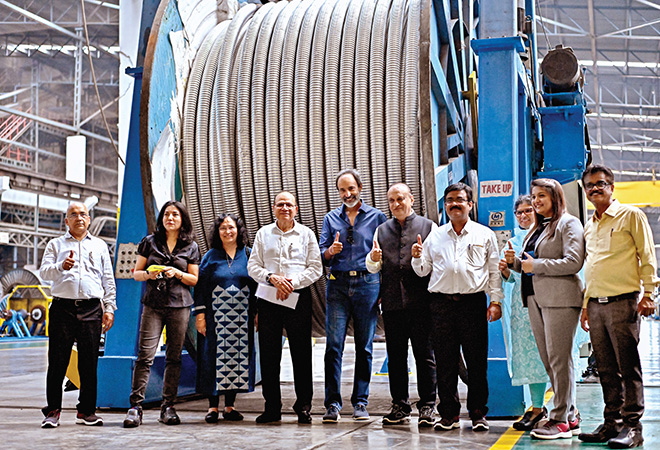
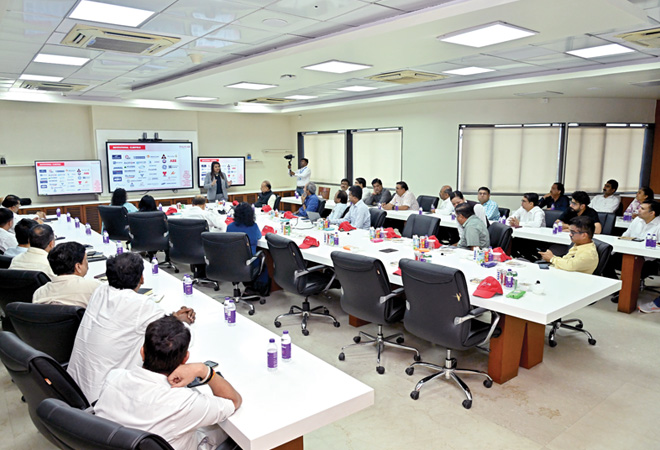


Topics Covered
- Oracle upgrade
- Project LEAP updates
- CSR projects
- Secretarial due diligence and Prohibition of Insider Trading (PIT) Regulations 2015
- Environment Social Governance (ESG) and Business Responsibility and Sustainability Reporting (BRSR)
Topics Covered
- Amendments in law & compliances thereto
- Subsidiaries’ operations and business strategy
- Project LEAP – business strategy
- Organisational structure and annual operating plans
Topics Covered
- Subsidiaries – Performance & Business strategy
- Analysis of Related Party Transaction
- Project LEAP – Business strategy
Topics Covered
- Vision, mission and aspirations for the Company
- Presentations by various Senior Managerial Personnel ivncluding Business Unit Heads
Topics Covered
- Session on new Criminal Law Regime:
- Bharatiya Nyaya Sanhita
- Bharatiya Nagarik Suraksha Sanhita
- Bharatiya Sakshaya Adhiniyam
- Subsidiaries – Performance and Business Strategy
- Marketing presentation
Topics Covered
- CSR site(s) such as Waste Management Site, Baska, Primary School, Asoj. And Anganwadi and Panch Devla regarding the CSR activities.
Topics Covered
- SCSR Projects and related compliances
- Project Spring
- SEBI (Listing Obligations and Disclosure Requirements) (Third amendment) Regulations 2024
- Project LEAP